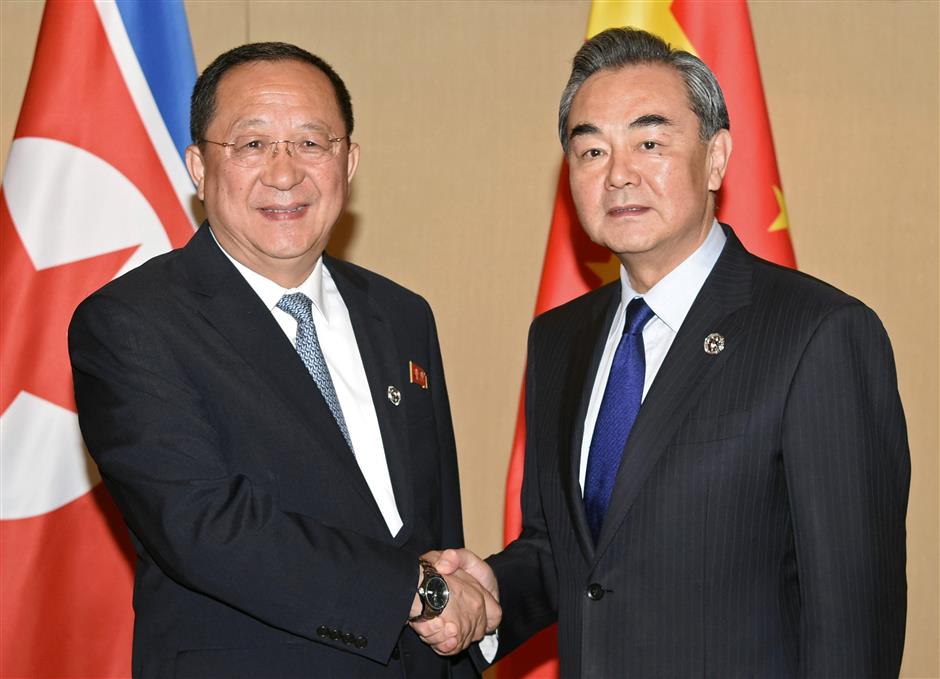China tells NK to be 'smart' after sanctions

Chinese Foreign Minister Wang Yi (right) greets North Korean Foreign Minister Ri Yong Ho in Manila yesterday. The ASEAN Regional Forum opens in the Philippine capital today.
North Korea was yesterday urged to make a “smart decision” after the United Nations imposed tough new sanctions on the country over its missile and nuclear programs.
“It will help the DPRK to make the right and smart decision,” Chinese Foreign Minister Wang Yi told reporters, after discussing the sanctions with North Korean Foreign Minister Ri Yong Ho ahead of a regional security forum in Manila.
The Democratic People’s Republic of Korea (DPRK) is North Korea’s official title.
However, Wang also emphasized that negotiations were the only way to solve the issue, after the United States had left open the possibility of military action against Kim Jong Un’s government.
Wang called for a resumption of the stalled six-nation talks — hosted by China and including the US, Japan, Russia, North Korea and South Korea — aimed at curtailing North Korea’s nuclear ambitions.
“It’s not that easy but it is a direction we need to work together toward,” Wang said of the six-nation talks. “Only dialogue and negotiation is the correct way out to address the Korean Peninsula issue.”
Both the sanctions and the resumption of the six-party talks are important and neither should be neglected, Wang said.
The talks were initiated in Beijing in August 2003, but have been stalled since December 2008. North Korea dropped out in April 2009.
The top diplomats from all six nations are in Manila for the ASEAN Regional Forum, an annual security forum, which begins today.
US Secretary of State Rex Tillerson has no plans to hold talks with Ri in the Philippines, his aides have said, but could meet him in one of the meetings.
On Saturday, the UN Security Council unanimously backed a US-drafted resolution that significantly strengthened sanctions on North Korea, imposing a ban on exports aimed at depriving Pyongyang of US$1 billion in annual revenue.
The sweeping measures were the first of that scope to be imposed on North Korea since US President Donald Trump took office.
The resolution imposed a full ban on exports of coal, iron and iron ore, lead and lead ore as well as fish and seafood by the cash-starved state — stripping North Korea of a third of its export earnings, which are estimated at US$3 billion per year.
US Ambassador Nikki Haley said the stiffer measures brought the penalty imposed on North Korea for its ballistic missile tests “to a whole new level” and that the council had put Kim “on notice.”
China, as a permanent member of the UN Security Council, upheld an impartial and objective position and played a responsible and constructive role in the process of the adoption of the resolution, Wang said.
He said there were two major components — one is to make a necessary response to North Korea’s constant missile launch activities which have violated UN Security Council resolutions in a bid to effectively check its nuclear and missile development programs.
The other is to call for the resumption of the six-party talks, stressing the peaceful settlement of the Korean Peninsula nuclear issue by diplomatic and political means, in order to avoid escalation of the tension on the peninsula.
Wang said the situation on the Korean Peninsula had entered a critical juncture and he urged all parties concerned to make responsible decisions.
Wang also expressed the hope that all parties can accept China’s proposal requiring North Korea to suspend missile and nuclear activities in exchange for the suspension of US-South Korea military drills.
At present, the proposal is the most practical, viable and reasonable solution, he said, adding that it can not only de-escalate tension, but also address various parties’ urgent safety concerns, and provide a way out for the Korean Peninsula nuclear issue.















